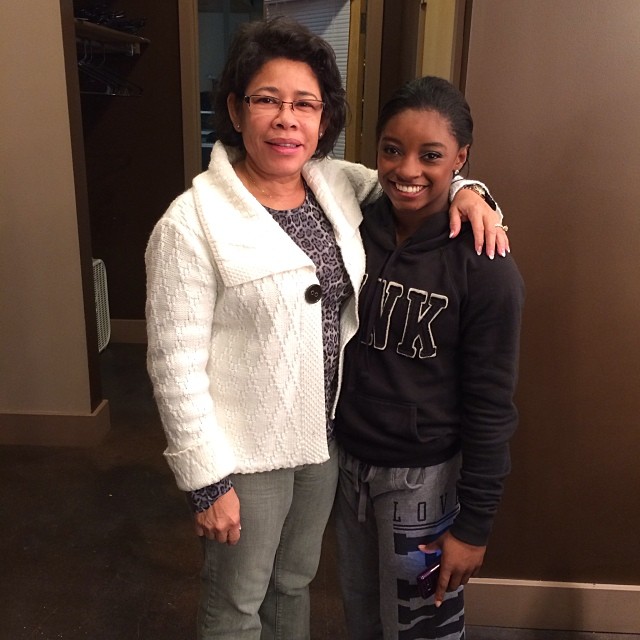If you don’t know the name Simone Biles, you most likely will now when the U.S. women’s gymnastics team goes for gold at the 2016 Summer Olympics in Rio de Janeiro.

Biles, the three-time United States and world all-around gold medalist in gymnastics, is the clear favorite in Rio, but the 19-year-old’s champion status also means mountains of pressure and expectations.
That’s where her mom comes in.
Thirteen ways to think like an Olympic champion

“I think the key is to stay grounded and focused on training and doing your best,” Nellie Biles of Spring, Texas, wrote in an email in the weeks before the Olympics got underway. “I always tell her she is strong and exudes a unique power which will take her far in life.”
Nellie Biles is married to Ron Biles, Simone’s grandfather. He and Nellie took in Simone and her younger sister, Adria, and then formally adopted them when Simone was just 6 because Simone’s mom was battling addiction to drugs and alcohol. Though Simone speaks to her biological mother and sees her from time to time, she recognizes Nellie as her mother.
:max_bytes(150000):strip_icc():focal(999x0:1001x2)/simone-biles-parents-7-240a0eb9c7744de1bd2bfcc7edccef11.jpg)
Asked specifically about Nellie, whom she calls Mom, Simone said she has always been there for her.
She encourages me and never lets me feel down about something for too long,” Simone Biles said in an email. “If I’ve had a bad day in the gym or needed emotional support, she was always there.”
That is a message Biles is relaying as part of her work with Procter & Gamble’s “Thank You, Mom” campaign, which is the company’s focus on the mothers behind Olympic athletes and the roles they play in helping their children realize their dreams.
Every Olympics, the campaign includes a tug-on-the-heartstrings video that brings tears to the eyes of even the most cynical viewer. During the 2012 and 2014 Games, the videos became some of the most widely viewed of the Olympics.

This year is likely to be no different. The video titled “Strong,” edgier than “Thank You, Mom” videos from Olympics past, showcases four mothers as they face life-changing challenges, including a car crash and a tornado, and how the strength they find to keep going on becomes a defining moment for their children on their path to victory.
“The film reminded me to fully appreciate my mom and the strength she provides me through her unconditional love and support,” she said. “She always told me that although I am small, that doesn’t limit my power or define me. For me, I don’t think about size – I focus more on being powerful and confident.”

Strength is a concept that most mothers might not think about every day, but it’s becoming more important than ever in modern motherhood, according to a survey of 14,000 moms by P&G, the first report of its kind conducted as part of the “Thank You, Mom” campaign.
Nearly 75% of moms in the United States said motherhood is more complex today than it was in the past, and just about every mom surveyed admitted that they did not anticipate the demands of motherhood, according to the report. Almost two-thirds said they needed to develop greater emotional strength once they became a mom.
“I agree, but at the same time, I think the deeper strength develops naturally and you don’t even realize you have it until one moment you look back and you realize you did a good job,” Nellie Biles said. “It’s hard to explain, really.”
She said her focus is doing anything Simone needs while helping her stay calm and “take it day by day” as she moves closer to her Olympic dream.
“My job is mainly support and to help keep her focused, relaxed and grounded,” Nellie Biles said. “She has it together. I am so proud of her.”
When we emailed with Simone and Nellie Biles back in April, Simone said she was trying to keep focused on training to make sure she’s prepared.
“Mentally, I have to get my body and mind in the right place before I start the routine, but once into the zone, it’s like I turn on a switch,” she said. “I envision myself doing the same thing for the Olympic Games.”
To take her mind off the pressure, Biles goes to church, likes to go shopping and loves getting her nails done.
“I am like any typical teenager,” she said, adding that she does the “typical stuff,” although she knows that not many teenagers make it to the Olympics and fewer still have a real chance at winning gold.
I asked whether she could imagine where she would be if she didn’t have the person she calls Mom in her life.
“Honestly, I cannot even imagine that,” she said. “How can you imagine life without the most important person in the world?”





